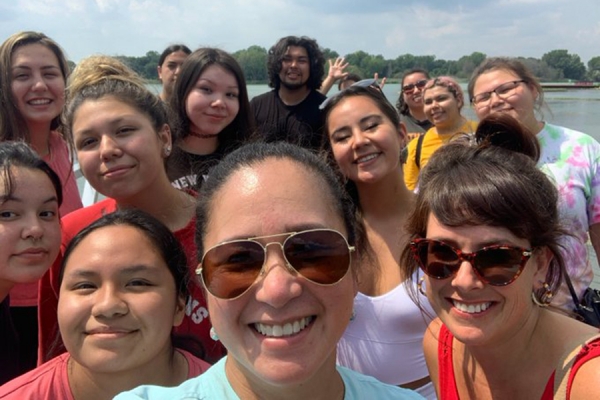 Catherine Febria, Candy Donaldson, and Bkejwanong Eco-Keepers youth at the University of Windsor’s Freshwater Restoration Ecology Centre. Photo credit: C. Febria, Healthy Headwaters Lab.
Catherine Febria, Candy Donaldson, and Bkejwanong Eco-Keepers youth at the University of Windsor’s Freshwater Restoration Ecology Centre. Photo credit: C. Febria, Healthy Headwaters Lab.
UWindsor’s Healthy Headwater Lab has won the 2021 ERCA Conservation Award for Environmental Education for work in restoring freshwater ecosystems to full health and vitality for the benefit of future generations.
The lab is run by Catherine Febria, Canada Research Chair in Freshwater Restoration Ecology, a professor in the Department of Integrative Biology, and a researcher with the Great Lakes Institute for Environmental Research.
The team’s mission, says Dr. Febria, is to use science to connect land, water, and people.
“Educational opportunities are important because local communities are the ones who transform our science into policy and practice, at a range of scales: from their backyard and farm field to across the region and beyond,” says Febria.
From the beginning, she says, the team has prioritized community engagement and knowledge mobilization as a key component of its research program.
“We employ an Indigenous Lab Storyteller in recognition of the power of knowledge sharing through stories across generations, since time immemorial, while also using communications as a tool to encourage the local Windsor-Essex community to reconnect with their local waterways, and thus be more interested in local biodiversity and restoration,” she says.
The team has generated newsletters for the farming community’s FERN News, and to the Bkejwanong Territory/Walpole Island First Nation community to regularly share updates on research in partnership with Nin.Da.Waab.Jig —the Walpole Island Heritage Centre — and the Walpole Island Land Trust on habitat restoration projects. They have mentored youth through the Bkejwanong EcoKeepers each summer since 2019, have been involved with the University’s first Traditional Ecological Knowledge field course, and featured an Indigenous Environmental Artist to create content that will soon be featured at the Ojbway Nature Centre.
The lab has a Farm Advisory Board of leading farmers in the region which provides input into the research. Its researchers also create plain language summaries of their scientific papers, and online resources for local educators to sample their waterways and identify benthic invertebrates.
“Education is an essential tool in the work we do,” Febria says. “As a lab we are motivated to restore freshwaters for the benefit of future generations. Thus, we recognize a responsibility towards engaging youth, especially in getting to know their local natural ecosystems and empower them to protect it.”
The lab conducts research in Canada, the United States, and New Zealand, focusing on such varied headwater ecosystems as drains, wetlands, streams, and interfaces between surface and groundwater in human-impacted landscapes. Febria founded the lab in 2019 and says it was a wonderful surprise to discover its work is already making a difference to the Windsor-Essex region.
“This award also means a lot because it comes directly from the community, and recognizes the efforts of the whole lab and not just one person,” says Febria.
“That’s fundamentally important to our lab, that we work as a team, collaboratively, and in a decolonial manner to pursue science in a way that engages local and Indigenous knowledges and builds upon relationships with our communities.”
Associate dean of graduate studies and research Dan Mennill says it is a rare and special achievement to be recognized by their community.
“Although there are many academic awards for researchers, this is a unique recognition that comes from our local conservation authority,” says Dr. Mennill. “The Faculty of Science is very proud of this achievement, which speaks to the significant local impact of the research by Dr. Febria and the Healthy Headwaters Lab.”
The award was officially announced on Jan. 20 in a ceremony hosted by the Essex Region Conservation Authority. To learn more about the team’s work, visit the Healthy Headwaters website.
